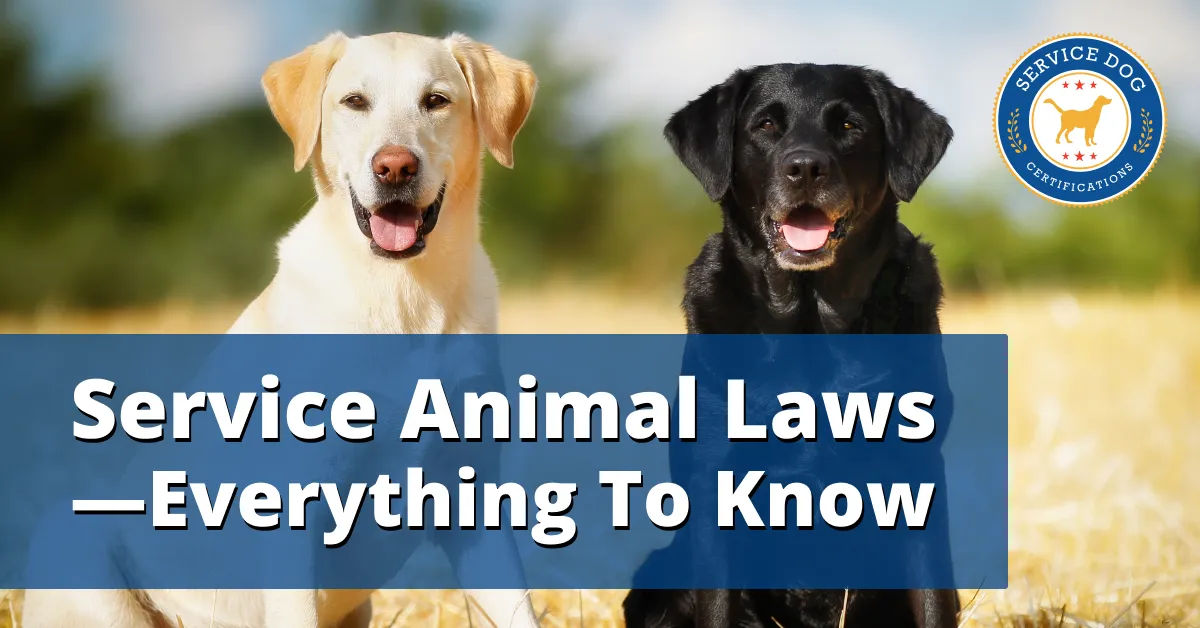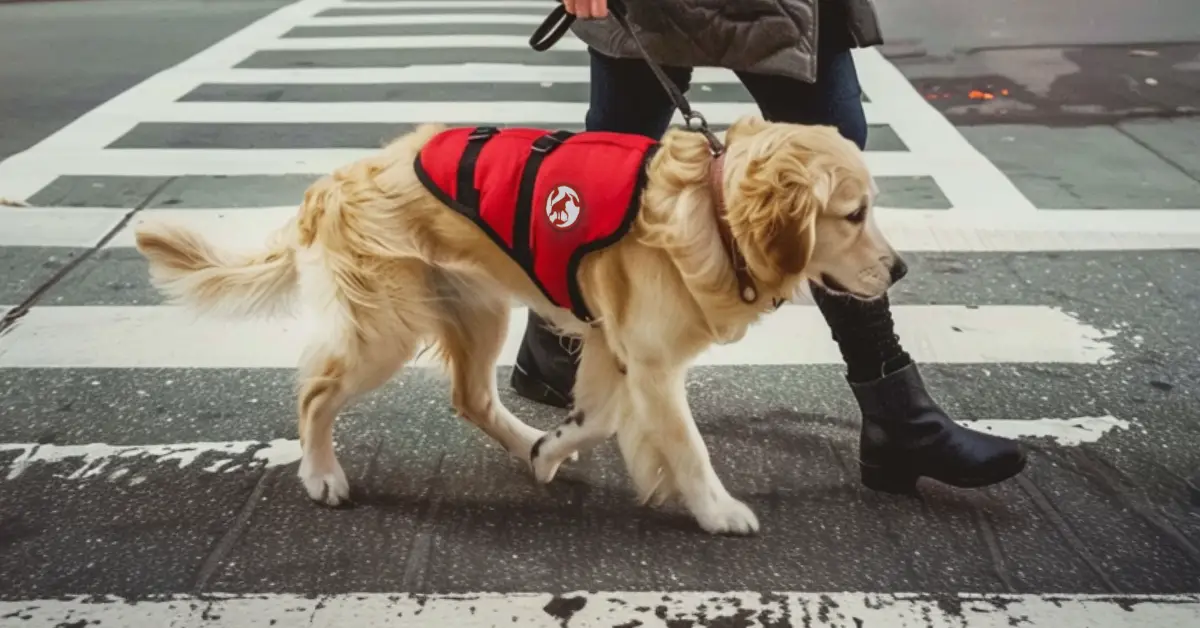Service Animal Laws

This article was last updated on August 27th, 2025
If you’re in a business, airport, or residential building with your service dog and need to know the law you can cite that protects you, this guide is for you. We’ll cover each of the major service dog laws in the United States that, together, give you the right to be accompanied by your service dog almost everywhere you go.
In this article:
- Public access rights under the ADA
- Housing rights under the Fair Housing Act
- Flying with your service dog under the ACAA
- Service animal state laws
Public Access Rights Under the ADA
The Americans with Disabilities Act gives you the right to bring your service dog almost everywhere the public can go. Under the ADA, a service dog must be trained to perform a specific task for a person with a qualifying disability. If you meet these requirements, your service dog can go anywhere you can go. Restaurants, stores, hotels, buses, hospitals — if it’s open to the public, your dog can come. The only real exceptions are places where your dog might pose a safety issue, such as an operating room.
Under the ADA, staff can only ask you two things:
- Is this a service dog?
- What work or task is the dog trained to do?
They can’t ask about your disability, and they can’t demand papers, certificates, or registrations.
Housing Rights Under the Fair Housing Act
The Fair Housing Act is what gives you the right to live with your service dog at home. Your landlord’s no-pet policy doesn’t apply to service dogs. Neither breed restrictions nor size limits apply.
Landlords can’t demand special forms or annual updates for permanent disabilities. Just like under the ADA, they can ask you two questions:
- Is the dog a service dog?
- What work or task has the dog been trained to perform?
These rules apply almost everywhere, including apartments, condos, dorms, nursing homes, and even most house rentals. The only exceptions are owner-occupied buildings with no more than four units, and single-family houses sold or rented by the owner without the use of an agent.
Your landlord can’t charge ANY fees for your service dog. No deposit. No monthly pet rent. No cleaning fees. If they try raising your regular deposit after learning about your dog, that’s also not allowed.
Flying With Your Service Dog under the ACAA
The Air Carrier Access Act (49 U.S.C. § 41705) covers air travel rights for your service dog. Your service dog travels free in the cabin, and there are no breed restrictions or additional fees.
Airlines will require you to submit the DOT’s Service Animal Air Transportation Form to the airline prior to your flight. Check out our guide on how to fly with a service dog if you want to learn more about the process.
Service Animal State Laws
In addition to the federal laws we’ve covered, which protect you everywhere in the U.S., many states have passed their own service animal laws that give you additional protection. Many states add criminal penalties for people who hurt service dogs or falsely claim to have one. Others protect dogs still in training. Here’s what five major states offer:
California
California’s Disabled Persons Act (Civil Code §§ 54-55.32) provides the toughest protections anywhere. Under Civil Code Section 54.1, service dogs have the same rights as their handlers to enter any public place.
The money damages start high. If someone denies you access, courts award a minimum of $4,000 per incident under Civil Code Section 52. One restaurant that turned away a handler three times ended up paying $12,000 plus attorney fees.
Service dog fraud is criminal under Penal Code Section 365.7. Anyone who lies about having a service dog faces up to six months in county jail and a $1,000 fine.
If someone hurts your service dog, California doesn’t mess around. Under Penal Code Section 600.5, intentionally injuring a service dog is punishable by up to one year in jail and $10,000 in fines. Killing a service dog can be charged as a felony. The person also pays full restitution — vet bills, replacement dog costs, and your lost wages while getting a new dog.
California explicitly protects dogs in training when they’re with authorized trainers. This means that professional trainers can take future service dogs into stores and restaurants for socialization purposes. Counties issue special tags under Food and Agricultural Code Sections 30850-30854, though these are optional.
Texas
Under Section 121.003 of the Texas Code, denying access is a misdemeanor punishable by a fine of $300 and 30 hours of community service.
The law assumes you suffered at least $300 in damages, even if you can’t prove specific harm. This makes it easier to sue businesses that discriminate. You don’t need receipts showing you had to eat somewhere else or proof of emotional distress.
Texas offers something no other state does. Under Government Code Section 661.910, state employees get up to 10 working days of paid leave to train with a new service dog. This isn’t vacation time — it’s separate leave specifically for learning to work with your dog.
Section 121.004 makes attacking a service dog serious business. It’s a Class A misdemeanor if your pet attacks a service dog. If the service dog is injured, it becomes a state jail felony. If the service dog dies, it’s a third-degree felony, carrying a sentence of 2–10 years in prison.
In 2023, Texas added Section 121.006, making it illegal to misrepresent a pet as a service animal. Violators face a misdemeanor charge, up to $300 fine, and 30 hours of community service specifically helping organizations that serve people with disabilities.
New York
New York Civil Rights Law Article 4-B covers service dogs comprehensively. Section 47 guarantees access rights, while Section 47-a protects dogs in training.
New York specifically protects professional trainers and puppy raisers. If you’re raising a future service dog for an organization, you can take that puppy into stores and restaurants. The law recognizes that proper socialization during puppyhood is essential for creating confident working dogs.
Under Section 47-c, intentionally injuring a service dog is a Class A misdemeanor carrying up to one year in jail. Violators also pay restitution covering all veterinary costs, the cost of retraining or replacing the dog, and any lost income.
The state explicitly prohibits requiring any special license or equipment. Businesses can’t demand to see an ID card or insist that your dog wear a vest. These items might make your life easier, but they’re completely voluntary.
Florida
Florida Statute 413.08 stands out for explicitly including miniature horses as service animals in public accommodations. While the ADA allows miniature horses in limited circumstances, Florida gives them the same broad access rights as dogs.
The statute is detailed about where service dogs can go. Section 413.08(3) lists everything from hotels to buses to theaters. It even covers “every other public accommodation, amusement, or resort to which the general public is invited.” That’s about as broad as you can get.
Florida protects service dogs in training under Section 413.08(8). Approved trainers can take dogs anywhere the public goes. The dog must wear a collar and leash identifying it as a service dog in training, but that’s the only requirement.
Criminal penalties for faking a service dog are found in Section 413.08(4). It’s a second-degree misdemeanor punishable by up to 60 days in jail, a fine of $500, and 30 hours of community service. The community service must be performed for an organization serving people with disabilities.
Florida Statute 413.081 covers what happens if someone hurts your dog. They pay everything, veterinary bills, the cost of getting and training a replacement dog, plus your lost wages. If they killed your dog, they also face third-degree felony charges.
Michigan
Michigan’s main service dog law is MCL 750.502c. It makes denying access a misdemeanor punishable by 90 days in jail and a $500 fine. Civil damages start at $200.
What’s unique is Michigan’s voluntary identification program under MCL 37.303. The Department of Civil Rights issues ID cards with your photo and your dog’s photo. You absolutely don’t need this ID — businesses can’t require it —, but many handlers find it stops the constant questions.
In 2023, Michigan passed Public Act 75, giving service dogs in training the same access rights as working dogs. Trainers and puppy raisers can now take future service dogs into any public accommodation.
MCL 750.50a protects service dogs from harm. Killing or injuring a service dog is a felony punishable by up to 5 years in prison. The offender also pays restitution, including veterinary care, replacement costs, and lost wages.
Michigan waives dog license fees for service dogs under MCL 287.291. It’s a small savings, maybe $15–$30 per year, but it helps offset the many expenses of maintaining a working dog.
Disclaimer: This article is for general informational purposes only. While we’ve tried to provide accurate and up-to-date information about service animal laws, we cannot guarantee completeness or accuracy. Laws change, and how they apply can vary depending on your specific circumstances. This content is not legal advice. For advice about your situation, consult a licensed attorney in your state.

About the Author: The writing team at Service Dog Certifications is made up of folks who really know their stuff when it comes to disability laws and assistance animals. Many of our writers and editors have service dogs themselves and share insights from their own experiences. All of us have a passion for disability rights and animals.
Related Articles

What Should You Do If You Are Discriminated Against Because You Have A Service Dog?
If you believe that you have been discriminated against because of your service dog, you will need to present facts in order to file a complaint. You should be able to do that by documenting what happened. Writing everything down will help because you won’t be able to remember all the details when you do get […]

Read More

Emotional Support Animal Laws
If you live in any state in the U.S. the Fair Housing Act is a federal law (meaning it applies across the country) that guards your rights as the owner of an emotional support animal. Your state might even have its own laws for extra protection. This guide will explain current laws and how they […]

Read More

Service Dog Requirements
The ADA defines a Service Animal as a dog individually trained to perform tasks or do work for the benefit of a person with a disability. A disability can be a physical impairment, but the ADA also includes mental illnesses that substantially limit one or more major life activities, such as depression, severe anxiety, or […]

Read More
Do I need to give landlord others documents after I show him service dog ID ?
Landlords cannot request or require documentation.
I’m from New York State.I have an emotional support dog which I left with a boyfriend while I went to work.When I went to pick up my dog he didn’t answer the door.I guess he decided he was my exboyfriend and refuses to give my dog back.I called the police and was told possession is 9/10 th of the law.I guess I’m confused because I have all the paper work and he is registered as an emotional support dog to me,so as a person with emotional issues do I have any right?
I have heart flutters and a murmur, which act up when I get over active or over tired, Casper will jump up on my lap and lean his body against me and not allow me up until my heart calms down
I need a ESA but I would also like him to be a therapy dog for the elderly in nursing homes. Can a dog be both?
Yes, your dog can help you as an ESA and then your dog can also work as a Therapy Dog. You may find these two articles helpful on the subject –
https://www.servicedogcertifications.org/how-to-certify-a-therapy-dog/
https://www.servicedogcertifications.org/how-to-qualify-for-an-emotional-support-animal/
Can I take my dog to any AirBNB like I could to any hotel?
Yes, it is a violation of both Airbnb and ADA regulations. Even if the Airbnb owner has a no pet or dog policy.
I am looking to adopt a dog and was wondering if someone can refer me to who I would contact to find a dog fit for my needs, and help financially to pay for a certified seizure alert dog. Help?
If I get a puppy to have as my ESA and / or service dog, would it be best to get the ESA certification before the service dog certification? I’m unclear as to timing on these? I have AutoImmune and would like to have my dog with me at all times, even on planes (Do you know if a 40 lb. can ride with me in the cabin without having to purchase another seat?)
An ESA and a service dog fulfill different purposes and are not part of the same process. The ESA simply helps reduce symptoms of the disability with their presence and only has limited access rights. Service dogs are trained to fulfill specific tasks the owner cannot do in times of need. An ESA requires a letter from a licensed mental health professional, while service dogs are for individuals who need a dog that performs tasks related to their physical or mental disability. As for the weight and size of the dog on airplanes, you may consult with the airline prior to booking for their rules on traveling with assistance animals. You may find this article on the difference between ESA’s and service dogs interesting https://www.servicedogcertifications.org/is-an-emotional-support-animal-same-as-a-service-dog/
Our cats would alert us to an oncoming seizure, and keep us from dissociating, does this count as a service for our handicap?
Unfortunately cats cannot qualify as service animals, under ADA rules only dogs are allowed to serve as service animals.
there is no license or certification for a service dog needed or required by the federal law under the ADA.Gov website. Anyone telling you other wise is a liar and trying to get money from you for a fraudulent document. If anyone asks for you to provide said documents they don’t know what the laws are and need to be educated.
That is correct, you do not need any type of documentation, including a certification or license, to prove that you own a valid service dog.
There is a ‘service dog’ living in a senior building who displays aggressive behaviour by lunging at people and other pets, barking, snarling and has even pushed a 88 year old woman up against wall due to his advancing in her direction. Terrified of dog. Owner insists dog won’t do harm and lets him off leash whenever she takes the notion. Also owner has bad knees and dog has pulled her on her face at least once to my knowledge. Management fails to pursue issue due to service animal requirements and we are basically paying rent to remain on constant alert when leaving units, common areas or exit doors. Help!!! Where do we turn
An assistance animal that is acting aggressively towards others can be denied accommodation in housing. A service dog must be under the control of its handler at all times. It is up to your building management to intervene if the situation is creating a safety hazard for other tenants.
I totally agree and i have Multiple Sclerosis. My dog helps with balance walking problems. Their are two gentlemen in my apartment complex that go out of their way to provoke her to the point she thinks they are coming at me. She has lunged at them and did not bite them but they antagonize her every time they both see me outside or in the hall way. One of the gentleman yell at her and throws his hand at her or stomps at her , but she gets very upset at them. Its only these two people that shows acts of aggression. One other lady in our complex does not show agression but does tell her Standard Poodle to watch my dog. Bottom line is there rights to protect my dog from people just starting trouble.
My wife and I live in Pennsylvania. My wife has intractable absence epilepsy without status epilepticus and had a service dog that was illegally euthanized last year by our landlady, her son, a humane officer that got a false report about neglect and others were involved too. They came into our rental space and illegally euthanized my wife’s service dog. And all they got was a slap on the wrist for it.
My wife and I weren’t home due to my wife having a doctor appointment/surgery. My wife’s epilepsy went downhill since that tragic day and she almost died due to not having the help she needed. Now, as of October 22, 2025 I decided to get my wife another service dog but the landlady won’t give me an answer as to whether or not I am allowed to get one and her son asked my wife if she can afford a service dog. We are living on only 1 income at the moment and I feel my wife’s health is more important that the landlady and her son’s abuse and discriminatory ways. My wife and I are going to be taking the dog with us from now on or my wife will stay home with the dog because now we know what they are capable of and my wife feels like that slap on the wrist they got was a slap in the face to her. Nothing was done and justice was not served.